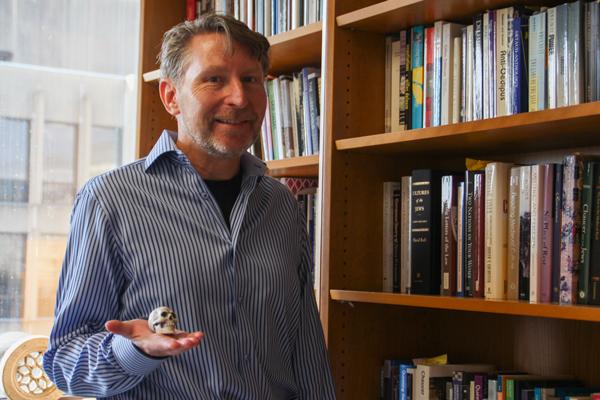The English department wants to recruit more students to the program.
The department’s “outreach committee” has started a series of programs this academic year to help connect with more potential English majors, minors and other students who might be interested in taking English courses. Faculty said they hope students who may have been deterred from enrolling in English courses – due to a lack of information or because they did not think it would lead to job prospects – will be encouraged to take English classes.
Jeffrey J. Cohen, a professor of English and chair of the committee, said faculty in the department began thinking of ways to increase outreach after a recent drop in the number of English majors, which he said has been a national trend.
Students are under increasing pressure to major in “marketable” fields but don’t realize that English degrees are valuable, Cohen said.
“We want students to know that an English degree shouldn’t be ruled out as something that leads to a viable career,” he said. “We feel like it gives important skills in critical thinking and especially in good writing that a lot of businesses, and you name it, are looking for.”
The outreach committee is made up of four English faculty members – Cohen, Robert McRuer, Jennifer Chang and Evelyn Schreiber – and undergraduate English major Julia Weiss.
Cohen said although the outreach committee formed about two years ago, members have focused on laying groundwork until this year and are now working on sharing information about the department with potential students.
The English department is trying out new programs, like a trick-or-treating open house later this month, to build a community for both students who major in English and those who don’t, Cohen said.
The open house will demonstrate to students that professors in the department are accessible, Cohen said. Alumni who studied English will attend the event to talk to students about their experiences.
“This idea of doing Halloween literary-themed trick-or-treating is partly to welcome our students into the space and make them feel at home here and get them to realize that we want to talk to them, we want to hear their ideas for how to make it feel more included,” Cohen said. “We’re hoping that it’s going to be the start of a year of really working on building our community – you know a community that includes all English majors, but it’s open to all GW students.”
Faculty in the department this year have used Facebook, Instagram, Twitter and the department’s blog to show students what they can do with English degrees, Cohen said.
“We feel like public outreach is what we should be doing as scholars, and then we decided that we should collaborate and share things like the GW English Instagram account,” Cohen said.
He added that the department has revamped entry-level courses to make them more attractive to non-majors, adding new classes like “Fantasy and Speculative Fiction” and “Bollywood Cinema,” and tweaking syllabi to include connections to contemporary topics and works.
Marshall Alcorn, chair of the English department, said in an email – which he said he wrote with input from other English faculty members – the faculty want more students to enroll in English courses. To up the numbers, faculty are creating courses that are responsive to students’ interests, creating a better environment for double majors and developing a more effective website, he said.
“We would like to have more majors, but we also would like to have more double majors, more minors and more students taking courses where they are encouraged to think about how literature and cultural expression impact the bigger issues of life and social responsibility,” Alcorn said.
He added English is a valuable major because students learn self-expression and cultural literacy, as well as how to examine art and society.
“English majors become incisive, elegant writers who know how to ask deeper questions and synthesize conflicting perspectives on literature, culture and life,” Alcorn said.
Weiss, the undergraduate student on the outreach committee, said activities like the yearly literary pumpkin carving contest and the upcoming trick-or-treating event will attract current majors but non-majors still may not participate.
The committee is considering hosting information sessions in residence halls to bring information to students where they are, rather than making students come to them, Weiss said. She added she hopes current English majors can advise potential students.
“I think prospective English majors have to be convinced of the merit of the degree, and I think there are no better people to do that than students who are already enrolled in the degree and are making something of themselves with the degree,” Weiss said.







